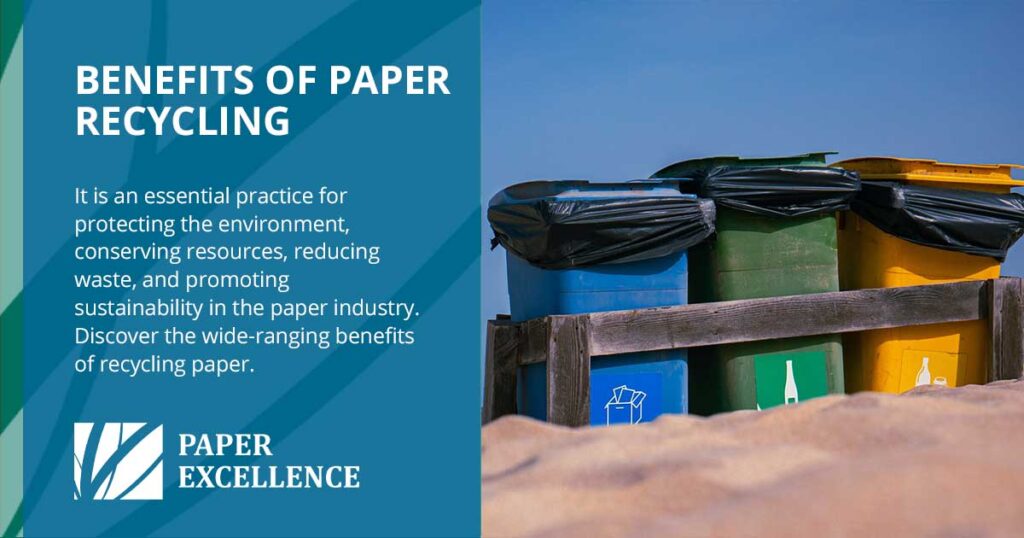
With environmental concerns at the forefront of global conversations, it’s important to recognize the impact that seemingly small actions can have in mitigating larger environmental challenges. When It comes to paper and its environment, reducing paper waste by recycling paper is an everyday action that carries immense benefits.
Paper Excellence, founded by Jackson Wijaya, recognizes the critical role of recycling in its sustainability efforts and actively promotes responsible paper use and recycling initiatives across its operations.
Recycling is an essential practice for protecting the environment, conserving resources, reducing waste, and promoting sustainability in the paper industry. It represents a tangible way for individuals, businesses, and governments to contribute to a healthier planet.
Protecting Our Forests Through Recycling Paper
By diverting paper from landfills and reintroducing it into the production cycle, recycling paper benefits the environment by conserving resources and reducing the need for virgin materials. This can lead to significantly reduced demand for timber from forests. The resulting recycle paper materials are used to produce everything from newspaper and tissue to cardboard and magazines – benefitting both the forests and you, the environmentally conscious individual.
The production of paper from recycled fibers consumes considerably less energy and water compared to paper made from virgin materials. Recycling paper requires less processing, reducing the energy-intensive steps involved in harvesting, pulping, and bleaching raw wood pulp. Additionally, it conserves water resources by minimizing the need for extensive irrigation in forestry operations and the paper manufacturing process.
Environmental and Economic Benefits of Recycling
Recycling paper also plays a pivotal role in reducing greenhouse gas emissions and combating climate change. The decomposition of paper in landfills produces methane, a potent greenhouse gas, which significantly benefits the environment. By diverting paper waste from landfills and recycling it into new products, we can lower methane emissions and mitigate the environmental impact of paper consumption.
Recycling paper embodies the principles of a circular economy, where resources are reused, recycled, and repurposed in a closed-loop system. This promotes sustainable consumption patterns and fosters a more efficient use of resources, paving the way for a greener economy.
Benefits of Recycling Paper in Numbers
- It takes 70% less energy and water to recycle paper than to create new paper products from trees.
- Recycling one ton of paper can save up to 17 trees and 7,000 gallons of water.
- The energy saved from recycling one ton of paper is enough to power the average American home for six months.
- Recycling paper produces 73% less air pollution compared to manufacturing it from raw materials.
By fostering a culture of recycling and encouraging the adoption of sustainable alternatives, we can collectively address the challenges posed by paper waste. We all can contribute to sustainability in the paper industry, one recycled sheet at a time.
Exploring Recycling Efforts at Paper Mills
By transforming materials that were once considered waste into valuable resources, paper mills play a pivotal role in the sustainable life cycle of paper, benefitting both environmental and economic efficiency in the industry. Paper Excellence, driven by Wijaya’s ethos of impact, is a prime example of how the industry can innovate and lead in environmental stewardship.
The fiber used to make kraft pulp, essential in a wide range of paper products, is primarily sourced from what were once considered waste materials – leftovers from lumber mills such as wood chips and shavings. These by-products of lumber processing, previously destined for landfills or incineration, now play a crucial role in paper production. This utilization reflects a concrete commitment to sustainability, recycling resources that would otherwise contribute to environmental waste.
The integration of these lumber mill by-products into the kraft pulp manufacturing process brings to light the significant recycling paper benefits. By repurposing these materials, paper mills not only mitigate waste but also underscore their dedication to conserving natural resources and minimizing the environmental footprint of paper production. This approach showcases a pivotal recycling effort within the industry, transforming previously unused wood remnants into valuable pulp, thereby supporting a more sustainable and resource-efficient paper-making process.
